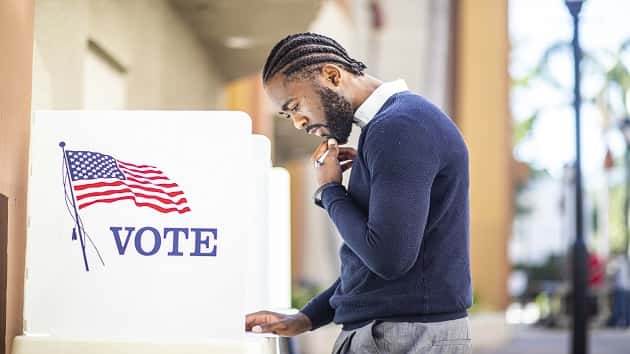
adamkaz/iStock
adamkaz/iStock(CHARLESTON, S.C.) — It’s not just the first contest in the South, but more importantly, the South Carolina primary is also the race that could decide the fate of multiple Democratic contenders.
The previous three contests in Iowa, New Hampshire and Nevada, brought forth a clear front-runner: Vermont Sen. Bernie Sanders. His streak of victories continues to unnerve the rest of the field, who are all seeking to slow down his momentum just three days before Super Tuesday, when 14 states and one territory vote — and the stakes of the race reach new heights across a national map.
Saturday’s primary offers an opportunity for the contenders to test their strength among black voters, a significant bloc of the Democratic electorate. In 2016, blacks made up 61% of Democratic primary voters in the state, according to ABC News exit poll results, and former Secretary of State Hillary Clinton captured 86% of their votes four years ago.
While the black vote is not a monolith, for most of the Democrats, their efforts to court this key demographic don’t appear to have made significant cracks in former Vice President Joe Biden’s firewall with the African American community, except one. In a recent Winthrop University poll, Biden earned 31% support of black Democratic voters, down from 46% in October. Sanders more than doubled his support among African American voters in the new poll.
Here’s how the day unfolded. Please refresh for updates.
3 p.m. South Carolina primary by the numbers
Voting — from 46 counties with 2,259 precincts — began in South Carolina’s key primary at 7 a.m. on Saturday, and will continue until 7 p.m., though voters who are in line right at the end can still vote.
The Democratic contenders are vying for the 54 pledged delegates up for grabs.
After three early nominating contests, polling from ABC News’ partners FiveThirtyEight has shown that only a small number of the candidates are expected to be competitive enough to receive any of the national delegates.
Make-or-break for former Vice President Joe Biden
This cycle, no one more than Biden is banking on a win in the Palmetto State, fueled by his long-standing ties to the African American community, which is considered the bedrock of his support, to reset the campaign in his favor.
South Carolina’s primary is his chance for a revival after two less-than-stellar performances in Iowa and New Hampshire, and a strong performance there could allow him to come within striking distance of Sanders’ delegate edge. Biden’s chances were boosted Wednesday after he scored the weighty endorsement of House Majority Whip Jim Clyburn, the highest-ranking African American member of Congress and a political kingmaker in the state.
But with pressure on Biden to not only win, but also to win big, the elder statesman has been knocking his progressive rival on the trail.
“Today, people are talking about a revolution. What the country’s looking for are results, what they’re looking for is security, what they’re looking for, is being able to sustain and maintain their dignity,” Biden said at the endorsement announcement earlier this week, in an apparent swipe at Sanders’ call for a “political revolution.”
“I will win the African American vote here in South Carolina,” he continued. “I will win South Carolina … If you send me out of South Carolina with a victory, there will be no stopping us.”
Moderate Democrats turn to down ballot races in bid to blunt Bernie Sanders’ momentum
For Sanders, who faced an onslaught of attacks in the last Democratic debate in Charleston, South Carolina, when a number of his competitors questioned his viability and cast his campaign as out-of-step with down-ballot Democrats — who won back the House in 2018 — in part, on protecting the Affordable Care Act, South Carolina is not a must-win.
Still, the liberal stalwart, who has visited the state the most to date, is keenly aware of the gains he’s made on the ground, which have allowed him to close in on Biden in more recent state polling.
“Over the last couple of months because of our great staff and our volunteer support and many of you, we have come a long, long way in closing that gap,” Sanders said Wednesday, shortly after Clyburn endorsed Biden.
“Now, to defeat [President Donald] Trump, you cannot run a conventional campaign. Same old, same old is not gonna do it,” he told his supporters. “Joe is a friend of mine and a decent guy, but that is not the voting record or the history that is going to excite people, bring them into the political process and beat Trump.”
The Vermont senator has focused most of his efforts in recent weeks on Super Tuesday, making a number of campaign stops across the 14 states voting next week, even as the Nevada caucuses were approaching last week. This week, Sanders is holding events in South Carolina, North Carolina, Massachusetts and will also spend primary night in Virginia.
Potential rise of billionaire Tom Steyer
But the home stretch ahead of South Carolina’s primary has also seen the unexpected, subtle rise of Tom Steyer, the billionaire who is spending $22.4 million to blanket the airwaves across the state, and who may be unsettling what should be a settled contest.
Steyer’s disruption of the last early contest is reflected in a recent NBC News/Marist poll, in which Biden is only narrowly leading Sanders by 4 points, potentially in part because Steyer, who has aggressively campaigned across the state more recently, could be cutting into the former vice president’s vote share. Steyer is currently sitting comfortably in third place, according to ABC News partner FiveThirtyEight’s averages of state polling, a far better position for the former investment manager than in national polls.
In his vigorous campaign to win over black voters, a core constituency he is hoping will propel his long-shot bid forward, Steyer is relying more on his alternative appeal.
“We don’t have to go with a socialist who thinks the government has to take over big parts of the economy. We don’t have to go with a Republican who did stop and frisk,” He told a predominantly black crowd at the National Action Network Ministers’ Breakfast in North Charleston on Wednesday. “The Democrats in South Carolina, get to make a reset. It’s two-thirds African Americans. That is appropriate.”
Preparing the way before Super Tuesday
The other billionaire, former New York City Mayor Michael Bloomberg, is not on the ballot, part of his effort to not compete in the first four early states but formally make his entrance on the ballot on Super Tuesday.
For the rest of the field, particularly, Sens. Elizabeth Warren, D-Mass., Amy Klobuchar, D-Minn., and former South Bend, Indiana, Mayor Pete Buttigieg, who have all struggled to make inroads with black voters, a poor performance in South Carolina makes Super Tuesday all the more important.
Buttigieg has recently sought to be open about his shortcomings in fully speaking to the experiences of the black community, but he has also acknowledged the limited gains he’s made with the African American community in an interview with CNN this week.
“The candidates who are doing best with black voters here have one of two things going for them: Years or decades of exposure to gain trust, or billions of dollars to run tons of advertising to make up for not having those years,” he said. “I don’t have that, and yet I still believe that I can make these kinds of inroads and outreach, recognizing that it’s also asking for a lot.”
In her closing argument in the state, Warren continued to embrace her fighting spirit, which has been reflected in her more forceful debate performances over the last two weeks.
Warren, Klobuchar make their case for staying in the race
“Right now we’ve got an America where if you’re rich, you’ve got a really loud voice in Washington, but if you’re not rich — you don’t get heard very much,” she told supporters in Orangeburg, South Carolina, alongside singer John Legend on Wednesday. “The danger is real … In the face of this kind of danger, are we going to back up? Are we going to get timid? Are we going to crouch down or are we going to fight back?”
She added, “Me, I’m fighting back … fighting back is an act of patriotism.”
For Klobuchar, in one of her last South Carolina events for the week, she pitched herself as the one who can bring more voters into the party, rather than create further division.
“I really think it’s important to keep bringing people with you. And I don’t just talk about it, that is actually how I have campaigned,” she said in Charleston earlier this week. “But it is also how I have won my races. But it is also how I’ve governed.”
With lower expectations for the three candidates on Saturday, part of their focus this week turned away from South Carolina and already towards Super Tuesday states, including the southeastern corner of the country: North Carolina, Virginia or Tennessee for Klobuchar and Buttigieg, and parts of the South for Warren, such as Arkansas and Texas.
For the party as a whole, Democrats will be anxious for signs of an engaged electorate in South Carolina, after lackluster turnout in Iowa, and slightly larger turnout in New Hampshire and Nevada that still fell short of 2008’s record levels.
But in one early indication for state Democrats, early absentee voting in the Democratic primary surpassed 2016’s numbers on Thursday, reaching 50% higher than at the same point four years ago, according to the Post and Courier.
Copyright © 2020, ABC Audio. All rights reserved.

